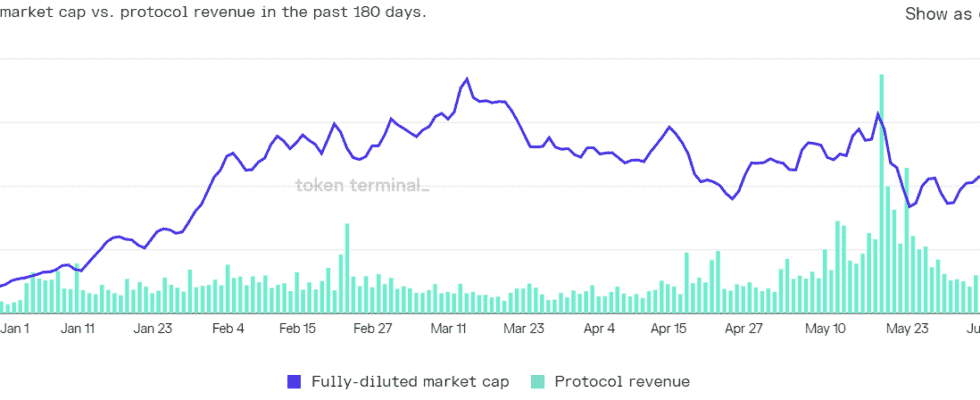For some time now, blockchain developers have been creating all types of tokens on Ethereum. In particular, tokens from Decentralized Finance (DeFi) have been extremely popular in the crypto space since last year. Some of them actually have an intrinsic value – where does it come from?
The possibility of generating a token on Ethereum (ETH) has basically existed since the invention of Ethereum and is not a new phenomenon compared to DeFi. So many different variants of tokens have emerged over time.
From utility tokens, which are sold via an Initial Coin Offering (ICO), to non-fungible tokens (NFT), to governance tokens or even memecoins, which are widespread in DeFi space, the Ethereum community already has a lot Experienced token experiments.
This jumble of tokens, which is difficult for newbies to understand, has resulted in many people’s minds seeing tokens as useless. Many think that they are for speculative purposes only and do not offer any fundamental added value. But as with so many things in the crypto world, that’s only part of the truth.
Especially in the world of decentralized finance, new token models are currently emerging almost every day. These models differ fundamentally from NFT or Memecoins. They could be extremely interesting, especially for investors from the traditional financial world, in the near future.
What are governance tokens?
Most of the DeFi tokens on Ethereum are primarily coordination tools. They enable people all over the world to come together to achieve common goals. In order to achieve this, holders of many DeFi tokens receive a say or, in some cases, monetary rewards or other benefits.
The best known example of this type of token are “governance tokens”. Many DeFi projects have issued governance tokens to their community since the middle of last year. Well-known projects that have done this include SushiSwap (SUSHI), Uniswap (UNI), Compound (COMP) or 1inch (1INCH). These protocols have used liquidity mining programs or airdrops, among other things, to distribute governance tokens to their community members.
Typically, these types of tokens are sold as “worthless” (probably for regulatory reasons). In most cases, their owners can only use them to vote on changes to the protocol or to make suggestions for changes to the protocol. Well-known tokens that can currently only be used for this purpose are UNI, COMP and Index Cooperative (INDEX).
The purpose of these tokens is therefore to decentralize DeFi protocols. This should give the community a feeling of shared ownership. In addition, this is intended to merge both user interests and the interests of the DeFi protocol operator. Governance tokens can therefore be anything but useless.
One point of criticism of governance tokens is the distribution of the tokens. In some DeFi projects it happens that a large part of the tokens already flow into the possession of a few people or groups in early investment rounds. This centralized distribution can have long-term adverse effects for the DeFi protocol.
Can DeFi tokens have an intrinsic value?
Many users consider existing governance tokens to be completely worthless because they only grant voting rights and no shares in the revenue of a DeFi protocol. Anthony Sassano, co-founder of the Ethereum analytics website ethhub.io, deems this view as myopic:
I think this is a short-sighted view as many DeFi protocols are still incredibly young. I therefore think it makes sense that the majority of the revenue they generate be reinvested back into the growth of the protocol, rather than being paid out to passive token holders.
It is already possible today for token holders of DeFi protocols to participate in the income of a DeFi project. For example, the token holders at SushiSwap and Aave (AAVE) have already voted for SUSHI and AAVE holders to share some of the log revenue when they stake their tokens.
If you look at the above graphic from Token Terminal If you look, you can see that SushiSwap is now generating over $ 300,000 in log revenue almost every day. The SUSHI community has currently voted for just under 0.05 percent of this income, i.e. almost 15,000 US dollars per day, to flow directly back to all SUSHI stakers.
Because of this, governance tokens can actually have fundamental value. The community of a DeFi project only has to decide to pay out log income to token holders. The fundamental value of a token can then be derived directly from the revenue generated by the DeFi protocol. How much revenue the various DeFi tokens generate can be viewed on Token Terminal see.
Conclusion
In the months and years to come, it is likely that we will see a wide variety of token models. Many of the models will fail, but some of them could well have substance and be used to rule over well-funded networks.
In the future, it is therefore conceivable that investors in particular from the traditional financial world will flock to the DeFi space. This is due to the fact that a large number of DeFi tokens will in the near future also be valued using valuation standards from the traditional financial world.
